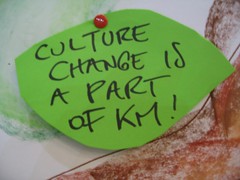I had not read Steve Barth’s blog in a while and today, while trying to catch up a bit, I saw this post on knowledge management: Letter to a young client
had not read Steve Barth’s blog in a while and today, while trying to catch up a bit, I saw this post on knowledge management: Letter to a young client
- Knowledge management builds collective capacity by increasing the efficiency and effectiveness of every individual manager and employee.
- Consider anthropology before technology, especially when it comes to tools and processes.
- Remember that people act on what they believe, rather than what they know. So information and expertise need to be transmitted through trusted and compelling mechanisms.
- Assume that organizational value builds from individual productivity first, then through team collaboration and institutional capacity. Enabling individuals to work together is a key priority.
- Transparency of information can be in conflict with the unconscious nature of professional expertise. Use multiple paths to create and share knowledge and information.
- Knowledge management should never be labeled as KM, but should follow in form and function the natural lines of behaviors and cultures already established in the organization and in the market.
- Outside consulting services should never create dependency, but help to build internal capacity.
People often say I’m a KM practitioner. I have never believed that knowledge could be managed. Steve’s advice jives with both my experience and my values. Thanks, Steve.
You might also enjoy a definition of KM that Steve posted earlier by the UK National Institute for Mental Health:
Knowledge Management is the cultivation of an environment within which people want to share, learn and collaborate leading to individual, team and organisational improvement.
Hi Nancy- it’s an old debate between KM and KS. I’ve never seen the problem using the term KM for managing knowledge sharing processes and people. In my eyes, it doesn’t imply that you manage knowledge directly, but you do it indirectly. (similarly to change management?)